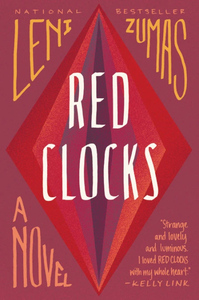Take a photo of a barcode or cover
As a feminist and a lover of dystopian future novels, I wanted to like this book a lot more than I did. I do think the premise is interesting, and it openly addresses themes that I think are important (fertility issues, a rational look at abortion from multiple angles, etc.), but I didn't find the story or the characters all that compelling.
Ironically, I think the best audience for this book is exactly the audience that would be least likely to pick it up: young male readers. I think there are still some people who are squeamish about women's health issues, and this at least presents a lot of viewpoints in a single plot. I just happened to not like the book that much.
Ironically, I think the best audience for this book is exactly the audience that would be least likely to pick it up: young male readers. I think there are still some people who are squeamish about women's health issues, and this at least presents a lot of viewpoints in a single plot. I just happened to not like the book that much.
This book is a must read given our current political climate. A smart, realistic story about the importance of women’s reproductive rights. I loved how each character had their own journey dealing with changes in the laws presented in this reality and how each of the 5 main characters tales weaved in and out of each other.
Ah, man, I loved this.
So timely and so beautifully written. It wasn't a dystopia like we've come to expect. No fantastical beasts or cages wrought with magic iron. Just a future that looks like the tomorrow we can all see coming. The tomorrow that is already beating down the door, breathing down our necks, putting the locks between our legs.
Yes, it's just a little TOO timely, like it was a write-by-numbers for a publishing house. But for once, that didn't irk me. Hit home.
So timely and so beautifully written. It wasn't a dystopia like we've come to expect. No fantastical beasts or cages wrought with magic iron. Just a future that looks like the tomorrow we can all see coming. The tomorrow that is already beating down the door, breathing down our necks, putting the locks between our legs.
Yes, it's just a little TOO timely, like it was a write-by-numbers for a publishing house. But for once, that didn't irk me. Hit home.
Reviews compare this book to The Handmaid's Tale, which sort of makes sense since it's set in a near future when abortion is illegal, fetuses are persons, and the law says every child "deserves" two parents. Stylistically, though, it bounces around among a number of characters and their interior monologues, so to my mind doesn't really sustain the tension one would expect from the comparison.
emotional
slow-paced
Plot or Character Driven:
Plot
Strong character development:
No
Loveable characters:
No
Diverse cast of characters:
No
Flaws of characters a main focus:
No
dark
emotional
sad
medium-paced
Plot or Character Driven:
A mix
Strong character development:
Complicated
Diverse cast of characters:
No
This book was not at all what I was expecting.
The story is told from different points of view.
1. The unhappy, aging Biographer
2. The naive Daughter
3. The independent, unusual Mender
4. The unhappy, borderline-suicidal Wife
I don't understand the purpose of including the wife. She hates her life, doesn't seem to care much about her children and often thinks of killing them all. It seems like her only purpose is to be hateful towards everyone, complain about how unhappy she is, and fantasize about driving her car off a cliff.
I also don't understand why we needed to know the content of the biographer's book in so much detail. I get it, she is writing a book about a woman who won't get credit for her discoveries, but I didn't see much significance to the story. I started skipping over these pages.
I thought this book might be funny. I thought perhaps it would make me think. I thought, given the subject matter, that I might enjoy it. Eh. I guess I thought wrong.
It wasn't the worst book I've ever read, but that's about all I can say about that.
(PS The author almost lost me in the first few chapters with the description of the smell of a woman's vagina and the excessive use of the word "cunt")
The story is told from different points of view.
1. The unhappy, aging Biographer
2. The naive Daughter
3. The independent, unusual Mender
4. The unhappy, borderline-suicidal Wife
I don't understand the purpose of including the wife. She hates her life, doesn't seem to care much about her children and often thinks of killing them all. It seems like her only purpose is to be hateful towards everyone, complain about how unhappy she is, and fantasize about driving her car off a cliff.
I also don't understand why we needed to know the content of the biographer's book in so much detail. I get it, she is writing a book about a woman who won't get credit for her discoveries, but I didn't see much significance to the story. I started skipping over these pages.
I thought this book might be funny. I thought perhaps it would make me think. I thought, given the subject matter, that I might enjoy it. Eh. I guess I thought wrong.
It wasn't the worst book I've ever read, but that's about all I can say about that.
(PS The author almost lost me in the first few chapters with the description of the smell of a woman's vagina and the excessive use of the word "cunt")
What is the cost of being alone? Women have always been referenced in relation to something or someone else - a wife, mother, sister, daughter - and if not part of that list, given time frames and timelines for their existence that is placed on real and imaginary analog, digital, and biological clocks.
In Zumas' Red Clocks, we see four women search, fight against, and yearn for being alone - whether that be from partners, their bodies, and strident ideas of being a woman in the world. We read the characters, who have names, but are referred to as subjects, resist the encroachment of people, womb, and expectation. The exploration of knowledge comes across loud and clear - we have innate wisdom in being quiet and calm and knowing oneself, and have a lot to be learned from the women before us, no matter and in response to the current political situation. Read Red Clocks and give yourself space to be certain in your own time and space, and yes, be alone with your thoughts.
In Zumas' Red Clocks, we see four women search, fight against, and yearn for being alone - whether that be from partners, their bodies, and strident ideas of being a woman in the world. We read the characters, who have names, but are referred to as subjects, resist the encroachment of people, womb, and expectation. The exploration of knowledge comes across loud and clear - we have innate wisdom in being quiet and calm and knowing oneself, and have a lot to be learned from the women before us, no matter and in response to the current political situation. Read Red Clocks and give yourself space to be certain in your own time and space, and yes, be alone with your thoughts.








